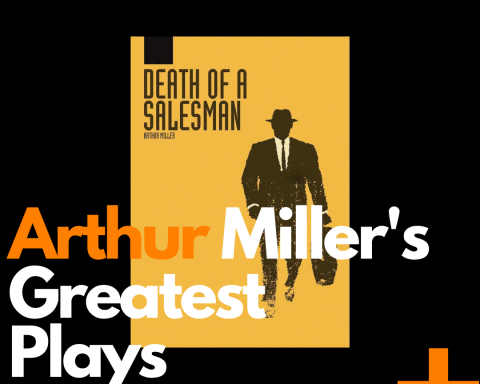
One of the greatest American Playwrights of all time Arthur Miller has penned some of the most iconic theater characters of all time like Willie Lowman from Death Of A Saleman. With all these incredible works and characters come really beautiful and timely monologues. As a working actor or actor in training you should almost certainly work on some or all of Arthur Miller’s great plays and really familiarize yourself with some of the iconic monologues. Working on monologues will only hone your craft and work that muscle which will translate into better character work and even scene work. In honor of the great Arthur Miller and all he has done for theater we have put together an incredible list of Arthur Miller Monologues from some of his most iconic plays.
Arthur Miller Monologues
Death Of A Salesman Monologues
Summary: Biff, who has been living in his father’s shadow for his whole life, finally confronts his old man about the realities of his work prospects and his desire to be freed from his father’s unrealistic expectations of him.
BIFF: Now hear this, Willy, this is me. You know why I had no address for three months? I stole a suit in Kansas City and Iwas jailed. I stole myself out of every good job since high school. And I never gotanywhere because you blew me so full of hot air I could never stand taking orders fromanybody! That’s whose fault it is! It’s goddamn time you heard that! I had to be boss bigshot in two weeks, and I’m through with it! Willy! I ran down eleven flights with a pen inmy hand today. And suddenly I stopped, you hear me? And in the middle of that officebuilding, do you hear this? I stopped in the middle of that building and I saw – the sky. Isaw the things that I love in the world. The work and the food and the time to sit andsmoke. And I looked at the pen and said to myself, what the hell am I grabbing this for?Why am I trying to become what I don’t want to be? What am I doing in an office,making a contemptuous, begging fool of myself, when all I want is out there, waiting forme the minute I say I know who I am! Why can’t I say that, Willy? Pop! I’m a dime adozen, and so are you! I am not a leader of men, Willy, and neither are you. You werenever anything but a hard-working drummer who landed in the ash-can like all the restof them! I’m one dollar an hour, Willy! I tried seven states and couldn’t raise it! A buck anhour! Do you gather my meaning? I’m not bringing home any prizes any more, andyou’re going to stop waiting for me to bring them home! Pop, I’m nothing! I’m nothing,Pop. Can’t you understand that? There’s no spite in it any more. I’m just what I am,that’s all. Will you let me go, for Christ’s sake? Will you take that phoney dream andburn it before something happens?
Willy: Business is definitely business, but just listen for a minute. You don’t understand this. When I was a boy, eighteen, nineteen, I was already on the road. And there was a question in my mind as to whether selling had a future for me. Because in those days I had a yearning to go to Alaska. See, there were three gold strikes in one month in Alaska, and I felt like going out. Just for the ride, you might say. Oh, yeah, my father lived many years in Alaska. He was an adventurous man. We’ve got quite a little streak of self-reliance in our family. I thought I’d go out with my older brother and try to locate him, and maybe settle in the North with the old man. And I was almost decided to go, when I met a salesman in the Parker House. His name was Dave Singleman. And he was eighty-four years old, and he’d drummed merchandise in thirty-one states. And old Dave, he’d go up to his room, you understand, put on his green velvet slippers, I’ll never forget, and pick up his phone and call the buyers, and without ever leaving his room, at the age of eighty-four, he made his living. And when I say that, I realized that selling was the greatest career a man could want. ‘Cause what could be more satisfying than to be able to go, at the age of eight-four, into twenty of thirty different cities, and pick up a phone, and be remembered and loved and helped by so many different people? Do you know? When he died, and by the way he died the death of a salesman, in his green velvet slippers in the smoker of the New York, New Haven and Hartford, going into Boston, when he died, hundreds of salesman and buyers were at his funeral. Things were sad on a lotta trains for months after that. See in those days there was personality in it, Howard. There was respect, and comradeship, and gratitude in it. Today, it’s all cut and dried and there’s no chance for bringing friendship to bear or personality. You see what I mean? They don’t know me anymore!
LINDA: Then make Charley your father, Biff. You can’t do that, can you? I don’t say he’s a great man. Willy Loman never made a lot of money. His name was never in the paper. He’s not the finest character that ever lived. But he’s a human being, and a terrible thing is happening to him. So attention must be paid. He’s not to be allowed to fall into his grave like an old dog. Attention, attention must finally be paid to such a person. You called him crazy, no, a lot of people think he’s lost his balance. But you don’t have to be very smart to know what his trouble is. The man is exhausted. A small man can be just as exhausted as a great man. He works for a company thirty six years this March, opens up unheard-of territories to their trademark, and now in his old age they take his salary away. Are they any worse than his sons? When he brought them business, when he was young, they were glad to see him. But now his old friends, the old buyers that loved him so and always found some order to hand him in a pinch, they’re all dead, retired. He used to be able to make six, seven calls a day in Boston. Now he takes his valises out of the car and puts them back and takes them out again and he’s exhausted. Instead of walking he talks now. He drives seven hundred miles, and when he gets there no one knows him anymore, no one welcomes him. And what goes through a man’s mind, driving seven hundred miles home without having earned a cent? Why shouldn’t he talk to himself? Why? When he has to go to Charley and borrow fifty dollars a week and pretend to me that it’s his pay? How long can that go on? How long? You see what I’m sitting here and waiting for? And you tell me he has no character? The man who never worked a day but for your benefit? When does he get the medal for that?
All My Sons Monologues
Chris Keller is a good son and has never revolted against his father until now. He went to war with his brother, Larry, but only Chris came back. His father, Joe Keller, owns a factory that made cylinder heads for airplanes during the war. Joe shipped disabled parts out of his factory, which ended up killing many American pilots, but he blamed it on another worker. Chris has finally found out after many years that his father is responsible for the incident, and his father is not who Chris thinks he is.
CHRIS: Dad…you did it? (Shocked but keeping voice down) You did it to the others? You sent out a hundred and twenty cracked engine- heads and let those boys die! How could you do that? How? (Voice rises with anger) Dad, you killed twenty-one men! You killed them, you murdered them. (Becomes more furious) Explain it to me. What did you do? (Pause) Explain it to me or I will tear you to pieces! You had a hundred and twenty cracked engine-heads. Why’d you ship them out in the first place? If you knew they were cracked, then why didn’t you tell them? (Relatively long pause, becomes more disgusted) You knew they wouldn’t hold up in the air. You knew that those planes would come crashing down. Were you going to warn them not to use them? Why did you let them out of the factory? (Pause) What kind of a man are you? Kids were hanging in the air by those heads. You knew that, and yet you did nothing about it! (Startled) You did it for me? You wanted to save the business for me? (With burning fury) Is that as far as your mind can see, the business? Don’t you have a country? Don’t you live in the world? What are you? You’re not even an animal, no animal kills his own, what are you? I ought to tear the tongue out of your mouth! What must I do? (Begins to weep) What must I do?
KATE KELLER: I was fast asleep, and — Remember the way he used to fly low past the house when he was intraining? When we used to see his face in the cockpit going by? That’s the way I saw him.
Only high up. Way, way up, where the clouds are. He was so real I could reach out and touch
him. And suddenly he started to fall. And crying, crying to me…Mom, Mom! I could hear him
like he was in the room. Mom! … it was his voice! If I could touch him I knew I could stop him, if
I could only – I woke up and it was so funny – The wind … it was like the roaring of his engine. I
came out here. I must’ve still been half asleep. I could hear that roaring like he was going by.
The tree snapped right in front of me – and I like – came awake. See?
We should never have planted that tree. I said so in the first place; it was too soon to plant a
tree for him.
The Crucible Monologues
MARY WARREN (18-year-old girl, accusing a woman of witchcraft, near hysterical)
I never knew it before. I never knew anything before. When she come into the court I say to myself, I must not accuse this woman, for she sleep in ditches, and so very old and poor….But then….then she sit there, denying and denying, and I feel a misty coldness climbin’ up my back, and the skin on my skull begin to creep, and I feel a clamp around my neck and I cannot breath air, and then………I hear a voice, a screamin’ voice, and it were my voice…..and all at once I remembered everything she done to me!!! So many time, Mister Proctor, she come to this very door beggin’ bread and cider…and mark this…whenever I turned her away empty…..she mumbled!!! You must remember Goody Proctor—last month—a Monday I think…she walked away and I though my guts would burst for two days after. Do you remember it?
ELIZABETH PROCTOR (a somewhat reserved woman, deeply worried about her husband’s affair and what the girl may do to her)
Spoke or silent, a promise is surely made. And she may dote on it now—I am sure she does—and thinks to kill me, then to take my place. It is her dearest hope, John, I know it. There be a thousand names, why does she call mine? There be a certain danger in calling such a name—I am no Goody Good that sleeps in ditches, nor Osburn drunk and half-witted. She’s dare not call out such a farmer’s wife but there be monstrous profit in it. She thinks to take my place, John. John, have you ever shown her somewhat of contempt? She cannot pass you in the church but you will blush…and I think she sees another meaning in that blush. I think you be somewhat ashamed, for I am there, and she so close. Go and tell her she’s a whore. Whatever promise she may sense break it John!! Break it!!!!!
ABIGAIL WILLIAMS (17, trying to coax the man she had an affair with to stop rejecting her)
Why, you taught me goodness, therefore you are good. It were a fire you walked me through, and all my ignorance was burned away. It were a fire, John, we lay in fire. And from that night no woman dare call me wicked any more but I knew my answer. I used to weep for my sins when the wind lifted up my skirts; and blushed for shame because some old Rebecca called me loose. And then you burned my ignorance away. As bare as some December tree I saw them all—walking like saints to church, running to feed the sick, and hypocrites in their hearts! And God gave me strength to call them liars, and God made men to listen to me, and by God I will scrub the world clean for the love of God. Oh John, I will make you such a wife when the world is white again! You will be amazed to see me every day, a light of heaven in your house, a…..Why are you cold?!
TITUBA (a slave from Barbados, trying to save her life after being accused of working with Satan) Bless Him. Bless Him. Eternal glory. Bless Him – bless God… Oh, bless the Lord. Was – was woman. It was black dark, and…Well, they was always talking; they was always runnin’ round and carryin’ on. I believe so, yes, sir. Oh, God bless you, Mr. Hale! Oh, God, protect Tituba! There was four. There was four. Oh, how many times he bid me kill you, Mr. Parris. He say, Mr. Parris must be kill! Mr. Parris no goodly man, Mr. Parris mean man and no gentle man, and he bid me rise out of my bed and cut your throat! But I tell him know. I don’t hate that man. I don’t want kill that man. But he say, you work for me, Tituba, and I make you free! I give you pretty dress to wear, and put you way high up in the air, and you gone fly back to Barbados! And I say, you lie, Devil, you lie! And then he come one stormy night to me, and he say, Look! I have white people belong to me. And I look – and there was Goody Good.
JUDGE DANFORTH (stern judge, defending his court proceedings)
Mister Hale, believe me; for a man of such terrible learning you are most bewildered—I hope you will forgive me. I have been thirty-two year at the bar, sire, and I should be confounded were I called upon to defend these people. Let you consider, now, and I bid you all do likewise:– in an ordinary crime, how does one defend these people? Let you consider, now— and I bid you all do likewise — -in an ordinary crime, how does one defend the accused? One calls up witnesses to prove his innocence. But witchcraft is ipso facto, on its face and by its nature, an invisible crime. Therefore, we must rely upon her victims—–and they do testify, the children certainly do testify. As for the witches, none will deny that we are most eager for their confessions. Therefore, what is left for a lawyer to bring out? I think I have made my point. Have I not?
REV. SAMUEL PARRIS (self-absorbed minister, horrified that his reputation is in danger)
I cannot blink what I saw, Abigail, for my enemies will not blink it. I saw a dress lying in the grass and I thought I saw someone naked running through the trees. I saw it! Now tell me true, Abigail. Now my ministry’s at stake; my ministry and perhaps your cousin’s life….Whatever abomination you have done, give me all of it now, for I dare not be taken unaware when I go before them down there. Abigail, I have fought here three long years to bend these stiff-necked people to me, and now, just now when there must be some good respect for me in the parish, you compromise my very character. I have given you a home, child, I have put clothes upon your back—now give me upright answer:— your name in the town—–it is entirely white, is it not? Abigail, is there any other cause than you have told me, for Goody Proctor discharging you? It has troubled me that you are now seven months out of their house, and in all this time no other family has ever called for your service.
JOHN PROCTOR (a flawed man admitting to having an affair with 17-year-old Abigail to the courts in order to save his wife’s life)
In what time and place? In the proper place, where my beasts are bedded. Eight months now, sir, it is eight months. She used to serve me in my house, sir. A man may think God sleeps, but God sees everything. I know it now. I beg you, sir, I beg you—see her what she is. My wife, my dear good wife took this girl soon after, sir, and put her out on the high road. And being what she is, a lump of vanity, sir (he starts to weep) Excellency, forgive me, forgive me. She thinks to dance with me on my wife’s grave! And well she might! For I thought of her softly. God help me, I lusted, and there is a promise in such sweat! But it is a whore’s vengeance, and you must see it; I set myself entirely in your hands, I know you must see it now. My wife is innocent, except she know a harlot when she see one!!!
A View From The Bridge Monologues
CATHERINE: Don’t, don’t laugh at me! I’ve been here all my life. Every day I saw him when he left in the morning and when he came home at night. You think it’s so easy to turn around and say to a man he’s nothing to you no more? You don’t know – nobody knows! I’m not a baby, I know a lot more than people think I know.
Beatrice says to be a woman but – then, why don’t she be a woman! If I was a wife I would make a man happy instead of going at him all the time! I can tell from a block away when he’s blue in the mind and just needs to talk to somebody quiet and nice. I can tell when he’s hungry or wants a beer before he even says anything. I know when his feet hurt him – I mean, I know him, and now I’m supposed to turn around and make a stranger out of him? I don’t know why I have to do that, I mean.
ALFIERI: You wouldn’t have known it, but something amusing has just happened. You see how uneasily they nod to me? That’s because I am a lawyer. In this neighborhood to meet a lawyer or a priest on the street is unlucky. We’re only thought of in connection with disasters, and they’d rather not get too close.
I often think that behind that suspicious little nod of theirs lie three thousand years of distrust. A lawyer means the law, and in Sicily, from where their fathers came, the law has not been a friendly idea since the Greeks were beaten.
I am inclined to notice the ruins in things, perhaps because I was born in Italy . . . I only came here when I was twenty-five. In those days, Al Capone, the greatest Carthaginian of all, was learning his trade on these pavements, and Frankie Yale himself was cut precisely in half by a machine gun on the corner of Union Street, two blocks away. Oh, there were many here who were justly shot by unjust men. Justice is very important here.
But this is Red Hook, not Sicily. This is the slum that faces the bay on the seaward side of Brooklyn Bridge. This is the gullet of New York swallowing the tonnage of the world. And now we are quite civilized, quite American. Now we settle for half, and I like it better. I no longer keep a pistol in my filing cabinet.
And my practice is entirely unromantic.
My wife has warned me, so have my friends; they tell me the people in this neighborhood lack elegance, glamour. After all, who have I dealt with in my life? Longshoremen and their wives, and fathers and grandfathers, compensation cases, evictions, family squabbles – the petty troubles of the poor – and yet . . . every few years there is still a case, and as the parties tell me what the trouble is, the flat air in my office suddenly washes in with the green scent of the sea, the dust in this air is blown away and the thought comes that in some Caesar’s year, in Calabria perhaps or on the cliff at Syracuse, another lawyer, quite differently dressed, heard the same complaint and sat there as powerless as I, and watched it run its bloody course.









